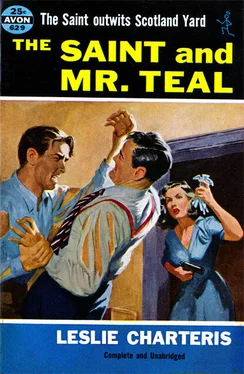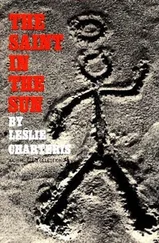Leslie Charteris - The Saint and Mr. Teal
Здесь есть возможность читать онлайн «Leslie Charteris - The Saint and Mr. Teal» весь текст электронной книги совершенно бесплатно (целиком полную версию без сокращений). В некоторых случаях можно слушать аудио, скачать через торрент в формате fb2 и присутствует краткое содержание. Год выпуска: 1955, Издательство: Avon, Жанр: Крутой детектив, на английском языке. Описание произведения, (предисловие) а так же отзывы посетителей доступны на портале библиотеки ЛибКат.
- Название:The Saint and Mr. Teal
- Автор:
- Издательство:Avon
- Жанр:
- Год:1955
- ISBN:нет данных
- Рейтинг книги:3 / 5. Голосов: 1
-
Избранное:Добавить в избранное
- Отзывы:
-
Ваша оценка:
- 60
- 1
- 2
- 3
- 4
- 5
The Saint and Mr. Teal: краткое содержание, описание и аннотация
Предлагаем к чтению аннотацию, описание, краткое содержание или предисловие (зависит от того, что написал сам автор книги «The Saint and Mr. Teal»). Если вы не нашли необходимую информацию о книге — напишите в комментариях, мы постараемся отыскать её.
The Saint and Mr. Teal — читать онлайн бесплатно полную книгу (весь текст) целиком
Ниже представлен текст книги, разбитый по страницам. Система сохранения места последней прочитанной страницы, позволяет с удобством читать онлайн бесплатно книгу «The Saint and Mr. Teal», без необходимости каждый раз заново искать на чём Вы остановились. Поставьте закладку, и сможете в любой момент перейти на страницу, на которой закончили чтение.
Интервал:
Закладка:
They went into the bar and found the barman enjoying his evening shave — a peculiarity of his which the Saint had observed before, and which struck Simon as being very nearly the perfect illustration for a philosophy of the Futility of Effort.
They carried their drinks over to the window at the bottom end of the bar, which looked across the harbour. The local boats were coming in to their moorings one by one, with their cargoes of holiday fishing parties. Simon studied them with a speculative eye as they came in.
"Whose boat's that — just coming in?" he asked; and the sergeant looked out.
"What, that nearest one? That's Harry Barrett's. He's a good boatman if you want to go out for the day."
"No — the other one — just coming round the end of Rat Island."
The sergeant screwed up his eyes.
"I don't know that one, sir." He turned round. "John, what's the name of that boat out there by the pier?"
The barman came down and looked out.
"That? That one's Lame Frankie's boat — the Puffin . Built her himself, he did."
Simon watched the boat all the way in to her mooring, and marked its position accurately in his memory. He discarded the idea of Barrett's trim-looking yawl reluctantly — he was likely to have his hands full while he was using the craft he proposed to borrow, and the Puffin , though she was too broad in the beam for her length, judged by classic standards of design, looked a trifle more comfortable as a single-hander for a busy man. And in making his choice he noted down the name of Lame Frankie for a highly anonymous reward; for the Saint's illicitly contracted obligations were never left unpaid.
But none of his intentions just then were public property. He held up to the light a glass of gin and bitters of astounding size for which he had been charged the sum of ninepence, and sighed.
"How I shall ever be able to bring myself to pay one and six for a drink about one eighth the size of this in London again, is more than I know," he murmured contentedly, and improved the shining hour by drinking it down rapidly and calling for another.
He strolled back with Patricia to their modest supper as it was beginning to grow dark. Their meal was just being put on the table.
"You poach a wonderful egg, Mrs. Nance," he remarked approvingly, and sank into his chair as the door closed behind that excellent landlady. "Pat, darling, you must wish me bon appétit , because I've got a lot to do on these vitamins."
She had not liked to question him before, but now she gazed at him resignedly.
"We were going away for a holiday," she reminded him.
"I know," said the Saint. "And we still are — away to the south, where there's sunshine and good wine and tomorrow is also a day. But we came by this roundabout way on a hunch, and the hunch was right. There is still a little work for us to do."
He finished his plate without speaking again, poured himself out a cup of coffee, and lighted a cigarette. Then he said:
"There's more nonsense talked about capital punishment than anything else, and the sentimentalists who organize petitions for the reprieve of every murderer who's ever sentenced are probably less pernicious than the more conventional humanitarians. Murder, in England anyway, is the most accidental of crimes. A human life is such a fragile thing, it's so easily snuffed out; and dozens of respectable men, without a thought of crime in their heads, have lost control of themselves for one second, and have woken up afterwards to the numbing and irrevocable realization that they have committed murder, and the penalty is death. There are deliberate murders; but there are other crimes no less deliberate and no less damning. The drug trafficker, the white slaver, the blackmailer — not one of them could ever plead that he acted in uncontrollable passion, or gave way to an instant's temptation, or did it because his wife and children were starving. All of those crimes are too deliberate — need too much capital, too much premeditation, too long to work through from beginning to end. And each of them wrecks human lives less mercifully than a sudden bullet. Why should the death penalty stop where it does?… That is justice as we have chosen to see it; and even now I believe that the old days were worth while."
He sat and smoked until it was quite dark; and, being the man he was, no detail of the future weighed on his mind. He scribbled industriously on a writing pads with occasional pauses for thought; and presently Patricia came round behind him to see what he had written.
At the top of the sheet he had roughly pinned the scrap of a report torn from the Daily Telegraph , and panelled it in characteristic slashes of blue pencil.
"… He saw his friend in difficulties," said the coroner,
"and although he could not swim himself he went to his
assistance. He did what any Englishman would have
done… "
The blue pencil had scored thickly under the last sentence. And underneath it the Saint was writing:
FLOREAT HARROVIA!
When Adam fell, because of Eve,
Upon that dreadful day,
He did not own up loud and strong,
And take his licking with a song,
In our good English way:
He had so little chivalry.
He said "The woman tempted me,"
And tried to hide away.
CHORUS:
But in the blaze of brighter days
Britannia yet shall rule,
While English Sportsmen worship God
And bend their buttocks to the rod
For the Honour of the School!
When Joshua strafed Jericho
(N.B. — another Jew)
He did not risk his precious gore
Or take a sporting chance in war
As English soldiers do:
He marched his bandsmen round the walls
And knocked it down with bugle calls—
A trick that is tabu. [chorus]
When Roland, at the gates of Spain,
Died beside Oliver,
He must have found it rather hard
To stand his ground and keep the guard,
Being a foreigner:
So we can only think he went
There by some kind of accident,
Or as an arbiter. [chorus]
When Louis faced the guillotine,
That calm the people saw
Flinched to a sickly pallor when
He knew he was an alien,
A Breed without the Law;
Where one of truly British phlegm,
Of course, would have leapt down at them
And socked them on the jaw. [chorus]
"Is all that necessary?" asked Patricia with a smile.
"Of course it is," said the Saint. "Because I've got an appointment with one kind of excrescence, must I forget all the others? God in heaven, while there's still a supply of smug fools for me to tear in pieces I shall have everything to live for… There are about five hundred and fifty more verses to that song, embracing everything from the massacre of Garigliano down through Christopher Columbus and Marco Polo to the last Czar of Russia, which I may write some day. I think it will end like this—"
He wrote again, rapidly:
But in our stately tolerance
We condescend to see
That heroes whose names end in — vitch
Are striving to be something which
We know they cannot be,
But, sweating hard, they make a good
Attempt to do what Britons would
Achieve instinctively.
CHORUS:
So let's give praise through all our days,
Again and yet again,
That we do not eat sauerkraut,
That some storks knew their way about,
And made us Englishmen!
"I can never finish my best songs — my gorge rises too rapidly," said the Saint; and then he looked at his watch, and stood up, stretching himself with his gay smile. "Pat, I must be going. Wish me luck."
Читать дальшеИнтервал:
Закладка:
Похожие книги на «The Saint and Mr. Teal»
Представляем Вашему вниманию похожие книги на «The Saint and Mr. Teal» списком для выбора. Мы отобрали схожую по названию и смыслу литературу в надежде предоставить читателям больше вариантов отыскать новые, интересные, ещё непрочитанные произведения.
Обсуждение, отзывы о книге «The Saint and Mr. Teal» и просто собственные мнения читателей. Оставьте ваши комментарии, напишите, что Вы думаете о произведении, его смысле или главных героях. Укажите что конкретно понравилось, а что нет, и почему Вы так считаете.












